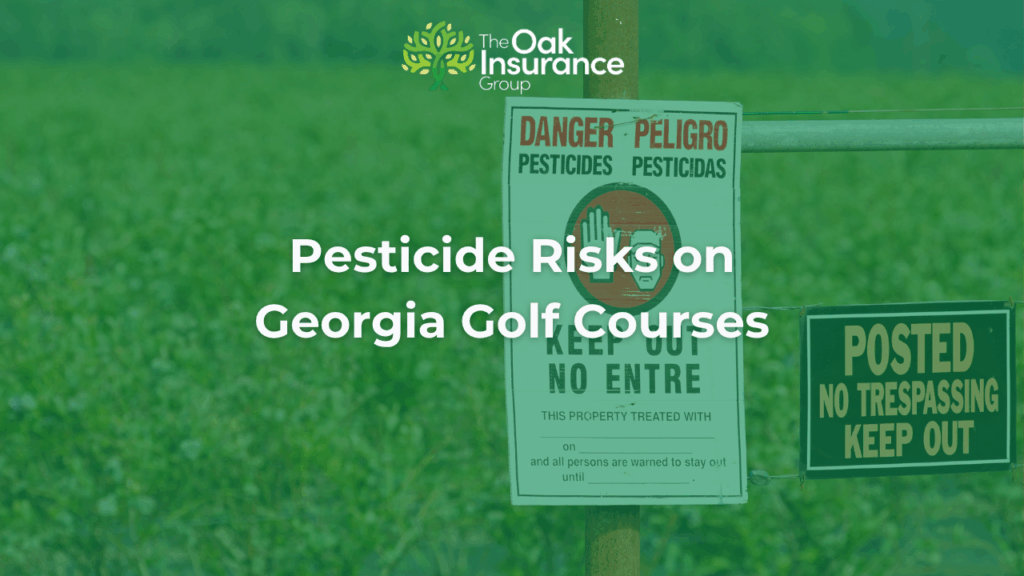
Are you putting your golf course at legal risk just by treating your turf?
Could a routine pesticide application land your operation in court—or worse, on the evening news?
Georgia’s picturesque golf courses depend on pristine turf—but lurking beneath that green perfection is a growing liability risk tied to pesticide and herbicide use. Recent shifts in state law, rising health concerns, and landmark litigation have changed the rules for golf course owners and superintendents.
In this article, you’ll discover the legal liabilities tied to chemical use on Georgia golf courses—and what you can do to protect your operations. We’ll break down:
- How Georgia law (including SB 144 and GA Code § 2-7-170) shapes your liability
- The health and legal risks of pesticide exposure—especially Parkinson’s links
- Four strategic steps to reduce your exposure, including insurance, training, and BMPs
Georgia’s New Legal Landscape: The Liability Shift You Can’t Ignore
Why GA Code § 2-7-170 isn’t the protection you think it is
Georgia law provides conditional protection under GA Code § 2-7-170—but only if golf courses strictly follow all labeling, regulatory, and best practice requirements. Even then, it doesn’t shield you from:
- Personal injury lawsuits from golfers or groundskeepers
- Property damage claims from neighbors
- Regulatory fines from the Georgia EPD
Bottom line: You’re not protected unless your records and practices are airtight.
Senate Bill 144: Why manufacturers are off the hook—and you’re not
Starting January 1, 2026, SB 144 limits pesticide manufacturer liability in Georgia. If their label complies with EPA standards under FIFRA, they can’t be sued for failure to warn about risks. That liability now flows downstream—to you.
| Law | Protection | Golf Course Risk |
|---|---|---|
| GA Code § 2-7-170 | Conditional immunity from strict liability | Requires full compliance; does not prevent injury or property damage lawsuits |
| SB 144 | Manufacturers shielded if EPA-compliant | Golf courses must bear burden of exposure prevention and employee/public warnings |
Health & Lawsuits: When Turf Chemicals Become a Legal Hazard
Parkinson’s, pesticides, and growing public concern
A 2025 study from the Parkinson’s Foundation revealed a 126% higher risk of Parkinson’s disease for those living within a mile of golf courses—largely due to chemical runoff. Compounds like paraquat, rotenone, glyphosate, 2,4-D, and dicamba have been flagged as neurological and cancer risks .
Golf course managers must protect not just workers—but also golfers and nearby residents from these exposures.
Litigation: The Monsanto precedent and why golf courses could be next
The 2018 Johnson v. Monsanto case, where a groundskeeper was awarded $289 million for exposure to Roundup, proved manufacturers aren’t untouchable. But under Georgia’s SB 144, plaintiffs may now focus lawsuits on applicators, especially if:
- Protective gear wasn’t provided
- Label instructions weren’t followed
- Public or worker warnings were inadequate
Four Pillars of Protection: How to Limit Your Legal Exposure
1. Regulatory Compliance & Documentation
To qualify for legal protection, you need bulletproof records. Key actions include:
- Ensure all pesticide applicators are licensed by the Georgia Department of Agriculture
- Maintain complete application logs (product, rate, location, weather, applicator name)
- Secure required permits from the Georgia EPD for applications near water
2. Adopt Golf-Specific Best Management Practices (BMPs)
Implementing BMPs from the Golf Course Superintendents Association of America (GCSAA) reduces chemical use and legal exposure:
- Use Integrated Pest Management (IPM) to minimize pesticide reliance
- Create buffer zones near water
- Avoid spraying during wind or rain
- Safely store and dispose of chemicals
3. Prioritize Employee Training and Protection
Your employees are your frontline—and your legal risk. You must:
- Provide mandatory PPE
- Conduct “right-to-know” training with access to Safety Data Sheets (SDS)
- Create emergency response protocols for spills and exposure events
4. Secure Specialized Environmental Insurance
Standard liability insurance won’t cover pollution events. You need:
| Policy Type | Covers |
|---|---|
| Premises Pollution Liability | Onsite chemical spills, runoff, or contamination |
| Contractors Pollution | Third-party pesticide application issues |
| Products Pollution | Risks from products you blend or sell |
| Transportation Pollution | Chemical spills during delivery or waste transport |
What Georgia Golf Course Operators Must Do Now
After years of traditional turf care practices, many course operators are unaware that the legal landscape has changed under their feet. Today, exposure claims, Parkinson’s research, and limited manufacturer liability have redefined the risk.
Now that you’ve seen the risks—and the clear steps to mitigate them—here’s what to do next:
- Audit your compliance, records, and insurance immediately.
- Implement or update your BMP and IPM programs.
- Train every applicator on safety, PPE, and emergency response.
- Consult with an environmental insurance expert specializing in golf operations.
You’re Done, But This Is Just the Beginning
At the end of the day, every Georgia golf course faces the same challenge: how to keep your turf pristine without putting your business—or your people—at risk. Now that you’ve seen exactly what the liability landscape looks like, it’s time to take action before someone else does.
Want to ensure your golf course is protected from pesticide-related legal exposure? Your next step is to review your insurance coverage and compliance program—or consult a legal expert to audit your operations.

